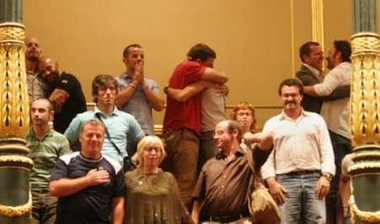. . . but I wasn't a pornographer*

safe enough for him?
Patrick Moore has an OPINION piece in today's Newsday, "Bush team uses 'skin game' to attack porn," which sounds an alarm on behalf of principles much greater than the protection of our access to adult sexual entertainment. An excerpt follows:
Under the guise of regulatory powers, the department [of Justice] is planning a punitive and ideologically motivated assault on the adult entertainment industry. A legal challenge last month delayed the onset, but Justice is hoping later this year to begin enforcing a host of regulations so onerous that they may represent the end of pornography as a viable business in America.Regardless of one's feelings about adult entertainment, the situation is a disturbing illustration of a larger trend in the Bush administration: the use of regulatory powers to advance a conservative moral agenda.
. . . .
One can understand that the government wants to ensure that porn performers are of legal age. However, these regulations ensure no such thing. In fact, in several lawsuits involving underage performers, the minors had provided government-issued IDs to producers. As we are learning in terms of both national security and immigration, government IDs are easily obtained and easily falsified. And demanding proof of age for performers who are clearly 30 or 40 years old seems less about protecting children than about punishing an industry the government deems immoral.
By focusing on regulatory enforcement, the Department of Justice cannily avoids repressing adult entertainment on the basis of content, knowing that the First Amendment presents a challenge that probably cannot be overcome. But the effect - suppression of protected speech, whether or not it is deemed obscene - is achieved outside the normal checks and balances of American government.
The Bush administration has a track record of attempting to regulate morality behind a smoke screen of law enforcement, bureaucratic rules and scientific research. These efforts are often focused on unpopular issues, where the administration is fairly certain that public opinion will provide protection, regardless of the ethics involved. Few citizens in an increasingly conservative America will fight to protect the constitutional rights of pornographers.
AIDS is another example. For several years now, researchers applying for National Institutes of Health grants to study AIDS have been told to remove references to gay men, even though they continue to represent the majority of cases here in the United States. And, famously, the Bush administration has touted its compassion for those dying of AIDS in Africa, even while it denies funds to organizations that offer reproductive health services or stress condoms over abstinence.
Full disclosure: I knew Patrick Moore slightly but I admired his good sense hugely when we were both busy with ACT UP fifteen years ago.
*
My introduction is a conscious reference to Martin Niemöllers lines about moral failure in the face of the Holocaust:
First they came for the Communists, but I was not a Communist, so I said nothing. Then they came for the Social Democrats, but I was not a Social Democrat, so I did nothing. Then came the trade unionists, but I was not a trade unionist. And then they came for the Jews, but I was not a Jew, so I did little. Then when they came for me, there was no one left to stand up for me.Yes, I know a morality crusade does not make a holocaust, but although we deal with new evils in new times, fascism's tactics, and the kind of popular response needed, have changed very little.
[image via E. Heroux]
